This story was published in partnership with The Guardian.
Introduction
On March 5, 2019, President Trump signed an executive order to create a “national roadmap to empower veterans and end suicide.” That same day, the U.S. Food and Drug Administration approved a new drug called Spravato for treatment of depression and suicidal intent. And over the next 24 to 48 hours, staffers at the Department of Veterans Affairs (VA) were flooded by managers with requests and orders regarding the previously unknown drug because, they were told by one of their bosses, the president himself thought Spravato would be terrific for the VA. Another official was heard to say that President Trump wanted the VA to buy “truckloads” of the drug.
The suggestion of White House interest stoked Washington’s special brand of bureaucratic chaos. By week’s end, more than 20 people at the Veterans Health Administration (VHA), which runs the VA’s medical centers, had kicked into high gear to get Spravato to patients. Within two weeks, likely a record for the usually lumbering approval process, the VHA was announcing that the drug would be made available to vets. By the end of March, scores of physicians would be involved.
The drug was getting great press too; The Washington Post and Bloomberg, among others, aired claims that Spravato, whose formal name is esketamine, was a new, fast-acting answer for treatment- resistant depression — a wonder drug. Five FDA officials who were involved in its approval, writing in the prestigious New England Journal of Medicine, called it “a novel treatment for a severe and life-threatening condition,” touting its “rapid onset of effect [as] a key benefit.”
But not everyone was convinced — far from it. The drug’s heightened profile has unleashed a storm of questions from academics, psychiatrists, and health researchers who have concerns about Spravato: how it was approved, how well it works, whether it is safe, how much it costs, and whether it’s right for veterans. The discussion has surfaced some unsettling concerns:
- The FDA abandoned a longstanding procedure of requiring two successful short-term trials before approving anti-depression drugs. Instead, when this drug showed itself to be no better than placebo in two of three short-term trials, the FDA accepted the one successful trial, adding on another and different type of trial that some say was deeply flawed.
- Even though the drug is being hurried into use by the VA, some psychiatrists and researchers say the evidence from trials does not demonstrate that the drug is effective on people over 65 — or possibly even on males. The VA’s patient population is 90 percent male and 52 percent over 65.
- During several years of trials, six people who had been treated with the drug died, as opposed to none on placebos. Three of the deaths were suicides. The FDA said it was difficult to conclude that the deaths were caused by the drug. Still, noted one psychiatrist, “It’s not heading in the direction supporting protection from suicides.”
- Data from the drug’s trials shows it to be only slightly better than placebos in its performance. “The benefit isn’t much,” said Julie Zito, professor emerita of pharmacy and psychiatry at the University of Maryland, who cast one of the two no votes on the FDA advisory committee that approved the drug.
- The dangers of treatment — mainly dissociation, hallucinations, sleepiness, and blood-pressure hikes — are so significant that patients must stay in the doctor’s office for two hours after receiving their Spravato infusion. The office must be equipped with equipment to deal with hallucinatory, cardiac, and respiratory problems. “A wonder drug? I think it’s a wonder that anybody thinks it’s a wonder drug,” said Diana Zuckerman, president of the National Center for Health Research, a nonpartisan institute that studies science and health in Washington, DC.
How the president learned of the drug and how exactly his enthusiasm was communicated to the VA remains a mystery. The White House declined to answer questions on that subject, as did the VA. Johnson & Johnson, and its subsidiary Janssen Pharmaceuticals which makes the drug, had been partnering with the VA on anti-suicide programs as Spravato was being developed. J&J was also working with a trio of Trump associates from his Mar-a-Lago club who have influenced VA policies. The three associates did not return phone calls and messages from the Center. But Spravato’s momentum continues. Last week Bloomberg reported that Trump, in a meeting with VA Secretary Robert Wilkie, offered to help the VA negotiate purchases of the drug from Janssen. Trump trumpeted the drug’s efficacy, saying, “You have people calling for help and if those people had that, I’m hearing like instantaneously they’re in better shape.”
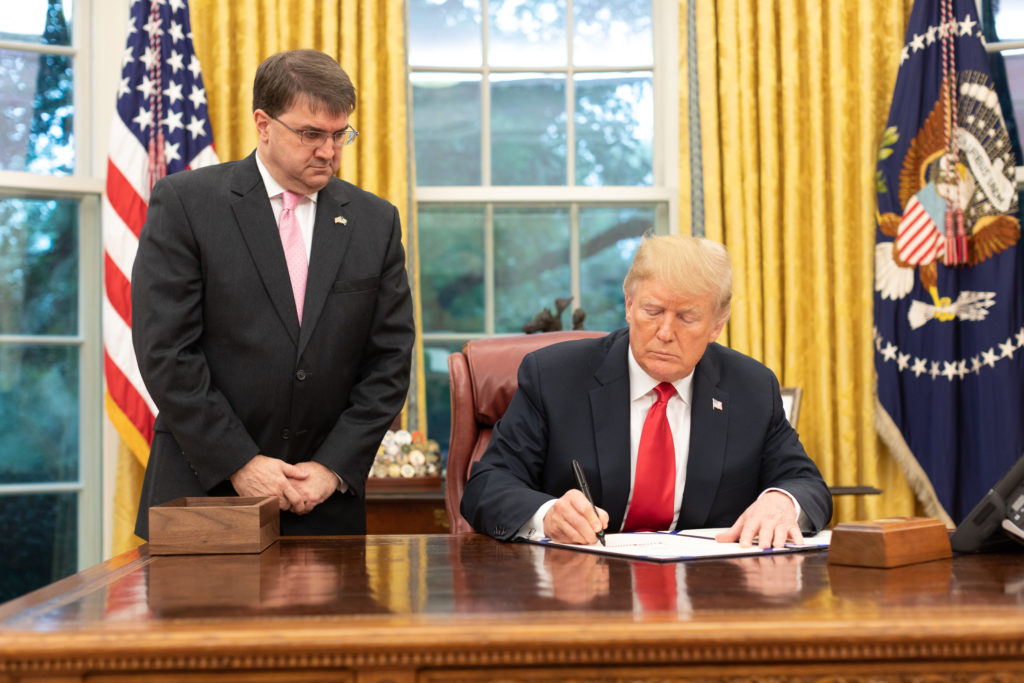
The VA declined to answer specific questions or grant interviews about the drug, its appropriateness for VA patients, and its hurried rush through the approval process. It provided a brief statement saying it “has approved the use of intranasal esketamine for adults with treatment-resistant depression (when used in conjunction with an oral antidepressant).” The statement went on to say that the “VA has not yet administered esketamine to any patients, and is in the process of designing a clinical implementation plan optimized for safety and efficacy.” The FDA declined to answer questions about the drug, its trials, or the approval process, referring a reporter to that article written by its officials for the New England Journal of Medicine.
The stakes are considerable. For Johnson & Johnson, facing an opioid-distribution trial in Oklahoma that may cost millions, Spravato could be a blockbuster: Analysts estimate it could earn $600 million by 2022. This week a VA committee will meet to decide whether to add the drug to its formulary — the list of drugs that must be available to VA pharmacies. If the drug is placed on the formulary, it could be a real boon for J&J’s marketing of Spravato. If the drug is not put on the formulary, doctors can still prescribe it “off-formulary” but the drug will lack the VA’s imprimatur. For veterans whose ranks are plagued by depression and suicides, much is at stake too. A drug that offers fast and lasting answer for treatment-resistant depression would be a godsend. But is this drug the answer?
A twisted history
Spravato is a derivative of ketamine, which was approved by the FDA in 1970 and licensed to Par Pharmaceuticals. Due to its hallucinogenic properties, it was used as an anesthetic for large animals, but it was also abused as a club drug known as “Special K.” In the 1990s a team of researchers at Yale tested it on seven patients with depression, and found that it worked, and fast — within a few hours. (Some scientists think Ketamine releases glutamate, which promotes the growth of neural connections in the brain that aid reasoning and pleasurable feelings.) Frustrated doctors turned to ketamine injections as an off-label drug of last resort for treatment-resistant depression, and ketamine clinics sprung up nationwide. Veterans Health Administration doctors give it to desperate patients, though not in large numbers.
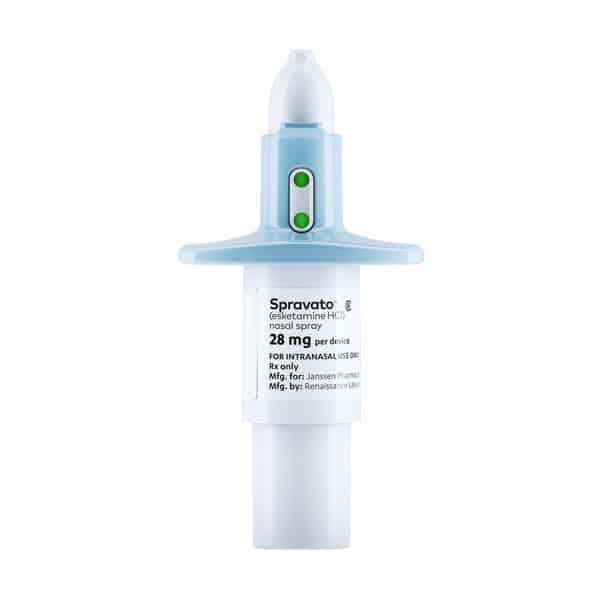
Ketamine’s dangers, too, have been well known — dissociation (an out-of-body feeling), sedation, suicidal thoughts, and hiked blood pressure are not unusual. Indeed, in April, 2017 a group of eight psychiatrists from an American Psychiatric Council task force wrote a consensus statement in JAMA Psychiatry saying there was an “urgent need for guidance” on ketamine use, citing “unanswered questions and concerns.”
Ketamine is off patent, meaning that it is readily available. Drug companies typically do not want to invest research dollars to find a new use for a drug they cannot patent. But the folks at Janssen Pharmaceuticals had an idea. Ketamine, like many drugs, consists of compounds of two attached molecules that are mirror images. It is possible to make a new drug of just one of the two molecules that has similar but not identical effects of the original. In this case, Janssen created a drug of only left-side ketamine molecules and called it esketamine. They also developed it as a nasal spray to avoid injection.
Janssen took esketamine into Phase I clinical trials, with small patient numbers taking small doses to test its safety. In November 2013 the FDA granted it Breakthrough Therapy Designation — meaning that early trials indicate the drug may offer substantial treatment advantages, and so it gets priority FDA review. Janssen then moved into Phase 2 trials, which involve more patients and require longer monitoring. During these tests, in a trial called SYNAPSE 2003, a 41-year-old male patient committed suicide by hanging. He had taken esketamine 20 days earlier.
In August 2016, based on the results of the phase 2 trials, the FDA granted esketamine another Breakthrough Therapy Designation, and Janssen moved into Phase 3 trials designed to test esketamine’s effects against those of a placebo. There were more patients — more than 1,700 in all worldwide, the majority being Caucasian women. Janssen also launched a so-called “withdrawal” trial, in which patients on esketamine were taken off to see how long it would take them to return to their previous condition.
Some longer-term trials were started too. Two of the patients in those trials committed suicide. One man, 38, three days off of esketamine, shot himself. Another, a 55 year old woman, 13 days off esketamine, killed herself with a multi-drug overdose. There were other deaths as well: a 41-year-old man, 26 hours off esketamine in a short-term trial, died in a motorcycle accident. Two esketamine takers died in the longer-term trials: one, 60, of cardiac and respiratory failure and the other, 74, of myocardial infarction. They had been off esketamine for 5 and 6 days respectively. Janssen said in a statement that “six deaths occurred, although none were considered by investigators to be related to Spravato.” The FDA would later say that given the small number of deaths and the severity of subjects’ depression, “it is difficult to consider these deaths as drug-related.” However, an equal number of patients received placebos in these trials. None of them died.
“Disturbingly, the FDA appears to inappropriately discount the possibility that these suicides were linked to esketamine exposure,” wrote the watchdog group Public Citizen. It had sent the FDA a 14-page letter on February 27, 2019 urging that the drug not be approved without more research, citing unproven efficacy and proven dangers.
“Disturbingly, the FDA appears to inappropriately discount the possibility that these suicides were linked to esketamine exposure.”
Letter from watchdog group public citizen
As the Phase 3 trials moved forward, Johnson & Johnson began a relationship with the Department of Veterans Affairs and that trio of civilian advisers who were associated with President Trump through social club Mar-a-Lago. The three, Marvel Entertainment Chairman Ike Perlmutter, Palm Beach physician Bruce Moskowitz, and attorney Marc Sherman, were labeled the “Mar-a-Lago Council” in a 2018 lawsuit by a veterans group against the VA, alleging that the group operated as an illegal advisory committee and had an outsized influence over President Trump’s decisions regarding the VA. Much of the lawsuit was based on an article by ProPublica. (The VA has moved to dismiss the suit, saying the trio were just individuals giving advice.)
The suit claims the trio convened a series of conference calls with J&J executives to discuss and promote a public awareness campaign about veteran suicides; as part of that effort, then-VA secretary David Shulkin was joined by J&J officials and characters from Perlmutter’s company, Marvel, to ring the closing bell on Veterans Day, 2017, at the New York Stock Exchange.
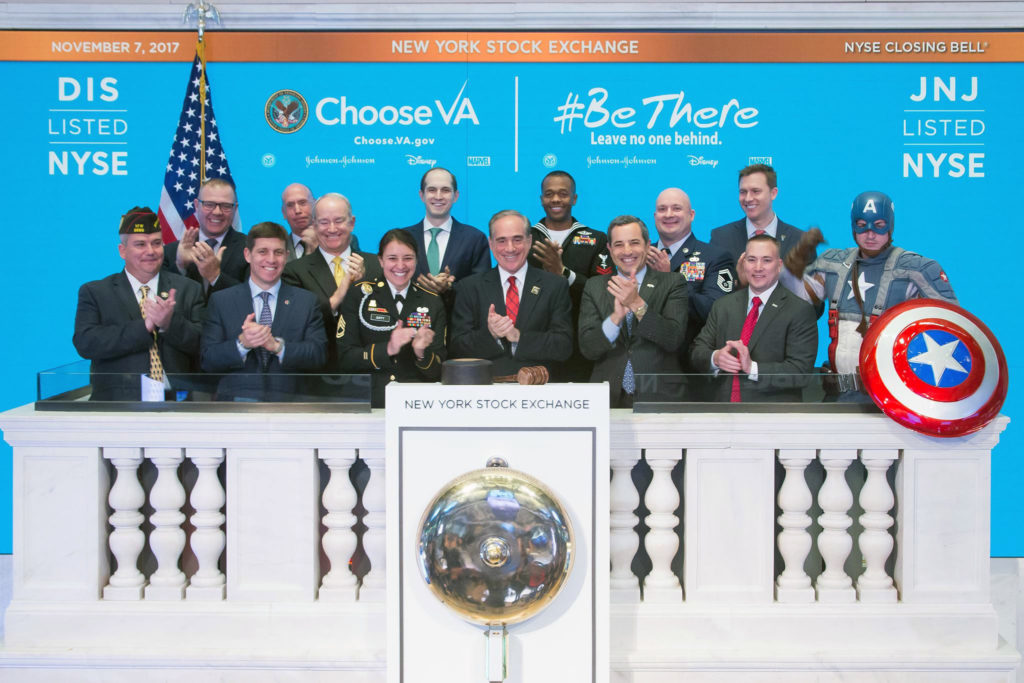
In responding to ProPublica’s queries, the trio cited Perlmutter’s “personal relationship with the President” and said they “offered our counsel, and the advice of these healthcare experts, to assist the President, Secretary and VA leadership in their making the essential decisions.” They said this was done voluntarily, “seeking nothing at all in return.”
As trials for the drug went forward in late 2017, J&J also joined the VA’s suicide prevention program, #BeThere. Johnson & Johnson’s website says that in 2018 and beyond the company will work with the VA to “undertake new clinical trial processes in hopes of providing access to the latest and most innovative treatments to help veterans in need.”
Records from the Center for Responsive Politics show that J&J was among the firms lobbying most heavily at the VA in 2018; records show J&J lobbying the VA on matters including “partnership with the VA on suicide prevention.” CRP records show that J&J spent a total of $6.6 million that year lobbying the federal government and hired a dozen lobbying firms to help. Employees of the company gave $14,165 to Trump’s 2016 campaign.
Relationships
Courtney Billington, a former Army captain and President, Neurosciences, of Janssen Pharmaceuticals, noted on the J&J website that Johnson & Johnson had a 115-year history of working with the military and “is uniquely positioned to reach, engage and empower the public to support the heroes in our communities.” In 2013 J&J CEO Alex Gorsky rang the opening bell at the stock exchange on Veterans Day with members of the U.S. Military Academy.
Asked if Janssen or J&J had a conflict of interest in partnering with the VA on anti-suicide programs while developing an anti-suicide drug it planned to sell to the VA, Janssen said in a statement that throughout the partnership, “we’ve had a memorandum of understanding in place that we’ve followed, and have strictly complied with the laws in place that govern partnerships across industry and government related to ethics and conflicts of interest.” It also said its work with the VA “does not involve any exchange of funds.”
Michael Carome, director of Public Citizen’s Health Research Group, took a different view of the partnership and the intended sale of the drug: “The circumstances you describe are disturbing and the conduct of the VA is unseemly,” he said.
When the Phase 3 trials were finished, the FDA called a joint meeting of its Psychopharmacologic Drugs Advisory Committee and Drug Safety and Risk Management Advisory committees on February 12, 2019, with 17 voting members present or on the phone. Janssen and FDA officials each presented hundreds of pages of material on the esketamine trials.
The vote of an advisory committee, with members who are clinicians or research experts in the field, is normally the last step before the FDA approves or disapproves a drug. The panels have long been controversial; a 2006 study by the National Research Center for Women & Families (now the National Center for Health Research) found that many of the committees approved almost every product they reviewed, that they bowed to pressure to conform, and they typically voted the way they sensed the FDA wanted them to vote.
In this case, the joint committee voted 14-2 with one abstention to approve the drug for release. Committee member Walter Dunn, mood disorder director at the West Los Angeles Veterans Administration Medical Center, a yes vote, told the panels “there is compelling evidence that esketamine is an effective treatment for this highly treatment-resistant population.”
But the vote was met with skepticism from some of the committee members and from more than a few outside psychiatrists and researchers. They zeroed in on the data from the trials. The trials themselves barely proved efficacy, they said, or even rapid action. The trials also did not show that the drug worked on patients over 65, nor, some argued, even on males. And the suicides concerned them.
The FDA’s acceptance of just one short-term trial, and replacement of the second short-term trial with another kind of trial, had not previously been done, the agency admitted, but was “not unreasonable.” FDA committee member Erick Turner of the Oregon Health and Science University, who did not make the meeting, called that FDA position “bullshit.” “It’s not a reason,” said Turner, a former FDA drug reviewer. “It’s like a parent saying, ‘Because I said so.’ ” Diana Zuckerman, president of the National Center for Health Research in Washington, DC, said the reason two trials are normally required is to show that results can be replicated. “It’s science,” she said.
Turner, Zuckerman, and Jess Fiedorowicz, an associate psychiatry professor at the University of Iowa who also works at the VA Medical Center-Iowa City, all had problems with the second trial the FDA accepted, saying, among other things, that it allowed patients to figure out whether they were on esketamine or the placebo. They also pointed out that the one short-term trial with patients over 65, a so-called “geriatric trial,” was unsuccessful. This and contentions from some that the trials did not demonstrate the drug’s effectiveness on men raised questions about its usefulness to the VA — whose patients are mostly male and over 65. Fiedorowicz said he wasn’t sure about the data on males, but it didn’t matter. “We have not even shown that the medication works,” he said. He chose to abstain from voting because the FDA approved the design of the trials.
Still, with the 14-2-1 advisory committee vote in hand, the FDA approved esketamine, with the trade name Spravato, on March 5. “There has been a long-standing need for additional effective treatments for treatment-resistant depression, a serious and life-threatening condition,” said Tiffany Farchione, M.D., acting director of the Division of Psychiatry Products in the FDA’s Center for Drug Evaluation and Research, in a press release.
On the same day, President Trump, who has claimed to champion veterans issues, signed an executive order on a National Roadmap to Empower Veterans and End Suicide. The seven-page document talked of a plan to “empower veterans and end suicide through coordinated suicide prevention efforts, prioritized research activities, and strengthened collaboration across the public and private sectors.”
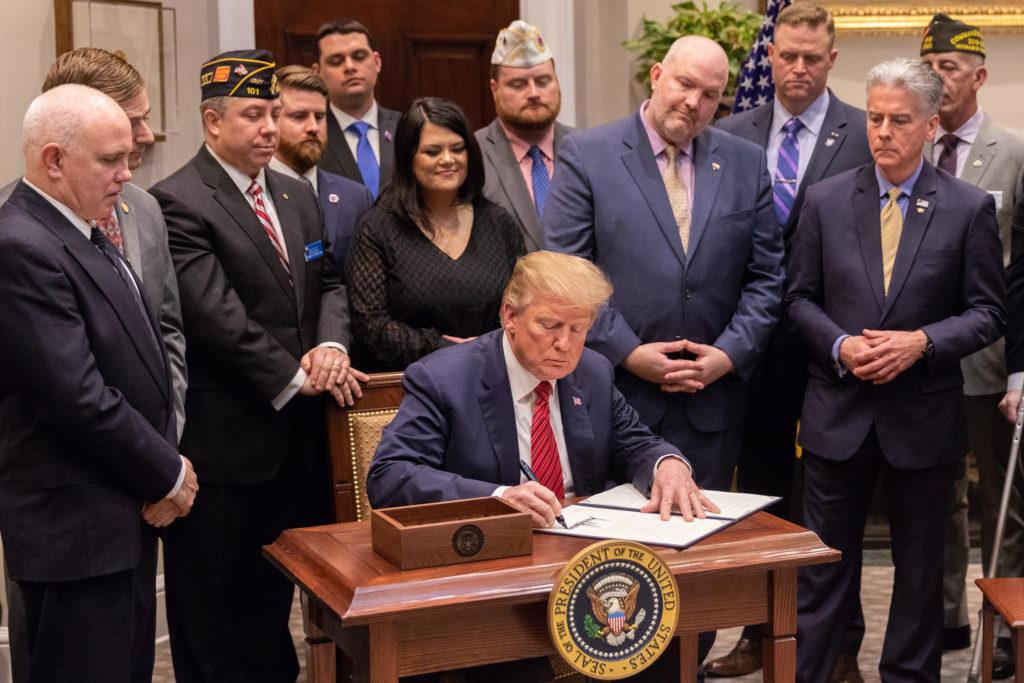
Within 24 to 48 hours, according to VA sources, agency staffers were scrambling after hearing that the president was urging them to buy Spravato in “truckloads.” Briefings were hastily prepared, and early morning meetings called. Staffers scoured their regions to find out what clinics, if any, were outfitted to handle esketamine treatment, and what would have to be done to add more clinics to the list. A contract with Janssen Pharmaceuticals was signed in 48 hours so that pricing could be nailed down. Normally such a contract takes a month or more. Patient consent paperwork was prepared. VA officials created Powerpoints, and a lengthy and detailed paper on the drug, its applications and uses and dangers was rushed into print. Efforts were initiated to equip new clinics to handle esketamine treatments. The press office began work on a statement.
On March 19 — two weeks after the FDA approved the drug — the VA announced that Spravato would be available for its patients. Its press release quoted Secretary Wilkie: “We’re pleased to be able to expand options for veterans with depression who have not responded to other treatments.” Staffers were told the goal was to treat the first VA patient with Spravato within 90 days.
But the debate over Spravato has not abated. On May 17, three psychiatrists, Michael D. Alpert and J. Wesley Boyd at Harvard Medical School, and Marco A. Ramos at Yale, published a piece at Vice.com headlined, “The New Ketamine-Based Antidepressant Is a Rip-Off.” The authors noted the cost of the drug, “nearly $900 per dose, or roughly $7000 for the first months of treatment,” and that the drug proved to be no better than placebo in two of its three short-term trials.
But “the biggest problem at hand is not the drug itself,” they added. “It’s the fact that instead of representing a revolution in mental health treatment, as it has been touted to do, esketamine is not a breakthrough at all.”
By week’s end, it will be clear whether the VA’s formulary committee agrees.
Ashley Lin Wong contributed to this story.
Read more in Health
Worker Health and Safety
On a day to mourn workers who died on the job, COVID-19 looms large
As we mark Workers Memorial Day, a time to remember those killed or injured on the job, OSHA faces pressure to adopt coronavirus-related measures.
Health
‘Unintended consequences’: The rubber industry’s toxic legacy in Akron
The stories of workers and their families reveal “unintended consequences” for life and health in the community.
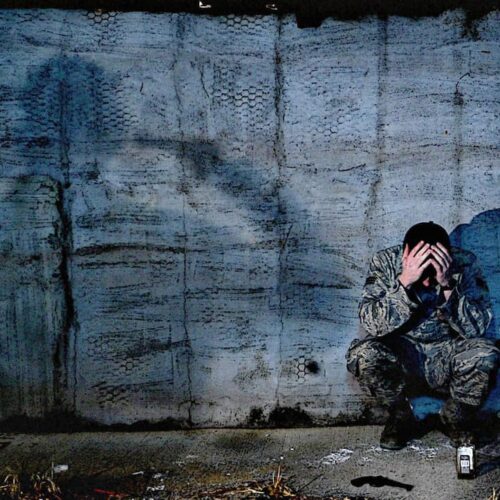
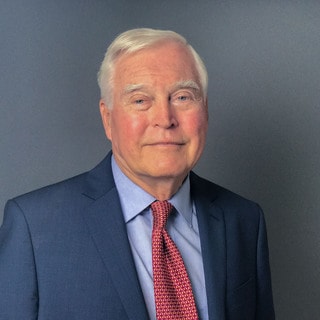
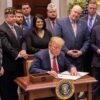
Join the conversation
Show Comments
I am curious why you claim to be independent in what you report when in fact you clearly are not. Any reader who understands the English language could easily tell that you are leaning hard to make it look like Trump LITTERALLY stated those words. If Trump actually stated to the VA to purchase the drug, why is it not directly sourced? I will tell you why, because then the WH would hold you accountable, that is why. First off, Trump could say whatever he wanted about a drug, that does not mean the VA would listen. Like any hospital… Read more »
If anyone is interested in the facts regarding Ketamine Therapy I will explain.
Why should the VA try it? WHY NOT? Daily suicides nationwide at VA clinics…what is there to lose?